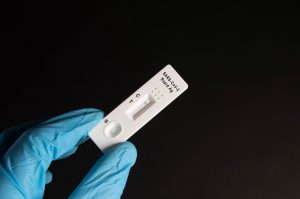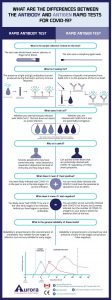
What are these COVID-19 Rapid Tests actually testing for, why are they useful, and what could my results mean?
Have questions about the Antibody and Antigen COVID-19 Rapid Tests? We provide a breakdown of both of these tests, including what they actually test for and what the test results may mean for you.
1. What are the sample collection methods for these tests?
Antibody: Uses whole blood, serum, or plasma. Can be obtained by either a venous blood draw or finger prick, similar to the blood draw you would get during a blood donation, or for testing blood sugar levels.
Antigen: Nasogpharyngeal swab.
2. What are these COVID-19 Rapid Tests actually testing for?
Antibody: The presence of IgM and IgG antibodies, produced by your body’s primary immune response, as a reaction to an infection.
Antigen: The presence of specific viral proteins from SARS-CoV-2, so the presence of the virus itself.
3. What do these COVID-19 Rapid Test actually tell us?*
Antibody: Whether you were previously infected with SARS-CoV-2; this test is not typically used to screen active infections
Antigen: Whether you are currently infected with SARS-CoV-2 and are potentially contagious.
*Disclaimer: These tests should not be considered sole-detection methods. They must be considered in conjunction with other factors, including the background rate of infection as well as if any symptoms are present at the time of the test.
4. Why are these rapid tests useful?
Antibody: This test can be used to rapidly screen a population for individuals that were previously infected, and thus may have some immunity to the virus. However, more research needs to be conducted to determine the strength and duration ofo this immunity.
Antigen: This test can quickly screen those that are potentially infected with COVID-19 at the time of testing, and thus may be contagious, regardless of if they show symptoms.
5. What does it mean if I test positive?
Antibody: You were likely infected with SARS-CoV-2 in the past or you are in the later stages of a current infection.
Antigen: You are most likely infected with SARS-CoV-2 and you have the potential to spread the virus to others.
6. What does it mean if I test negative?
Antibody: There are three possibilities here: (1) you were never infected with SARS-CoV-2, (2) you are infected but your body has not begun producing antibodies, or (3) you are infected and you have begun to produce antibodies but their concentration is too low to be detected by the test.
Antigen: There are two possibilities here: you are either (1) not currently infected with SARS-CoV-2, or (2) you are currently infected but the number of SARS-CoV-2 antigens in your body is below the detection limit of the test. The second scenario would occur at either the very early or very late stages of an infection.
7. What is the general reliability of these tests?
Antibody: Reliability is proportional to the concentration of antibodies. As such, this test is more reliable for the late stages of and post-infection than for early stages.
Antigen: Reliability is proportional to viral load. As such, low viral presence at the early or late stages of infection can produce falses negatives.



